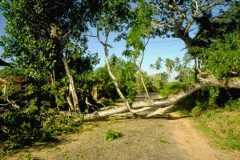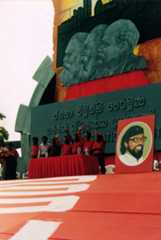Janatā Vimukti Peramuṇa
Enlarge textShrink textCorporate Body
- Save successfulThe item can be found in your Personal ZoneשגיאהLog in to your account to save






The Janatha Vimukthi Peramuna (JVP; lit. 'People's Liberation Front', PLF) is a Marxist–Leninist political party in Sri Lanka. The party was formerly a revolutionary movement and was involved in two armed uprisings against the government of Sri Lanka: once in 1971 (SLFP), and another in 1987–1989 (UNP). The motive for both uprisings was to establish a socialist state. Since then the JVP has entered mainstream democratic politics and has updated its ideology, abandoning some of its original Marxist policies such as the abolition of private property, and moderating its rhetoric. The JVP has been led by President Anura Kumara Dissanayake since 2014. The JVP was initially a small organisation that became a well-organised party that could influence mainstream politics. Its members openly campaigned for the left-wing coalition government of the SLFP-led United Front; however, following their disillusion with the coalition, they began an insurrection against the Dominion of Ceylon in early 1971. The JVP's military wing, the Red Guard, captured over 76 police strongholds throughout the island of Ceylon. The JVP entered democratic politics in 1977 when President J. R. Jayewardene released JVP leader Rohana Wijeweera from prison. Wijeweera contested in the 1982 presidential elections and was the third most successful candidate, winning 4.16% of the votes cast. Before the elections, he had been convicted by the Criminal Justice Commission (CJC) for conspiring to overthrow the state violently. The JVP launched a more organized insurrection for the second time in 1987 after the signing of the Indo-Sri Lanka Accord. Following Operation Combine and Wijeweera's death, the JVP returned to elections as the National Salvation Front. The surviving JVP members campaigned in the 1994 elections, but eventually withdrew and supported the nationalist Sri Lanka Freedom Party, the main opposition party at the time. In 2004, it joined the government as a part of the United People's Freedom Alliance and supported the government in its war against the Liberation Tigers of Tamil Eelam (LTTE), but subsequently left the coalition government following disagreements over the 2002 ceasefire agreement and distribution of aid following the 2004 tsunami. Since 2019, the JVP has contested elections under its own national coalition, the National People's Power (NPP) and has since been a prominent party in Sri Lankan politics. In the 2024 presidential election, JVP leader Anura Kumara Dissanayake was elected President of Sri Lanka. In the 2024 Sri Lankan parliamentary elections, the JVP led NPP alliance won with 159 seats in the parliament, winning a supermajority. It was the second-highest proportion of seats in the nation's history and the NPP succeeded in winning a majority of seats in every district except Batticaloa.
Read more on Wikipedia >